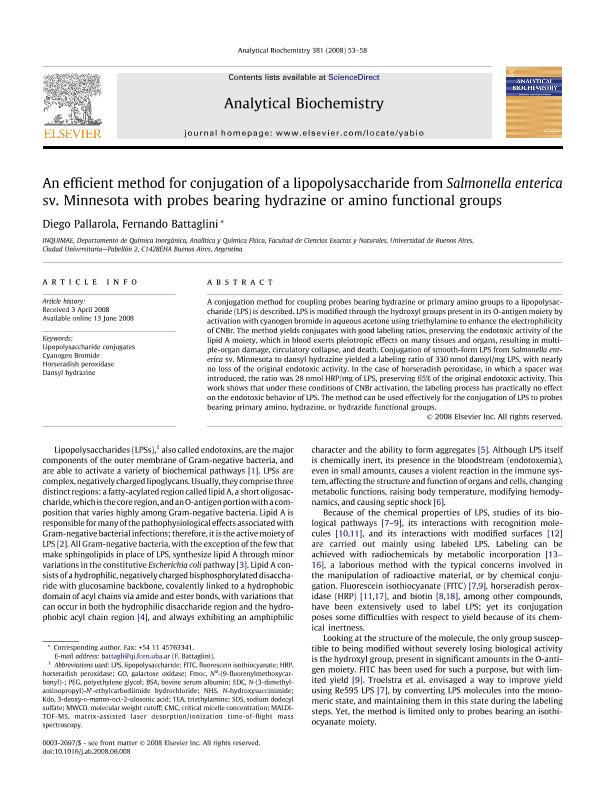Mostrar el registro sencillo del ítem
dc.contributor.author
Pallarola, Diego Andres

dc.contributor.author
Battaglini, Fernando

dc.date.available
2019-04-12T22:32:23Z
dc.date.issued
2008-10
dc.identifier.citation
Pallarola, Diego Andres; Battaglini, Fernando; An efficient method for conjugation of a lipopolysaccharide from Salmonella enterica sv. Minnesota with probes bearing hydrazine or amino functional groups; Academic Press Inc Elsevier Science; Analytical Biochemistry; 381; 1; 10-2008; 53-58
dc.identifier.issn
0003-2697
dc.identifier.uri
http://hdl.handle.net/11336/74339
dc.description.abstract
A conjugation method for coupling probes bearing hydrazine or primary amino groups to a lipopolysaccharide (LPS) is described. LPS is modified through the hydroxyl groups present in its O-antigen moiety by activation with cyanogen bromide in aqueous acetone using triethylamine to enhance the electrophilicity of CNBr. The method yields conjugates with good labeling ratios, preserving the endotoxic activity of the lipid A moiety, which in blood exerts pleiotropic effects on many tissues and organs, resulting in multiple-organ damage, circulatory collapse, and death. Conjugation of smooth-form LPS from Salmonella enterica sv. Minnesota to dansyl hydrazine yielded a labeling ratio of 330 nmol dansyl/mg LPS, with nearly no loss of the original endotoxic activity. In the case of horseradish peroxidase, in which a spacer was introduced, the ratio was 28 nmol HRP/mg of LPS, preserving 65% of the original endotoxic activity. This work shows that under these conditions of CNBr activation, the labeling process has practically no effect on the endotoxic behavior of LPS. The method can be used effectively for the conjugation of LPS to probes bearing primary amino, hydrazine, or hydrazide functional groups.
dc.format
application/pdf
dc.language.iso
eng
dc.publisher
Academic Press Inc Elsevier Science

dc.rights
info:eu-repo/semantics/openAccess
dc.rights.uri
https://creativecommons.org/licenses/by-nc-nd/2.5/ar/
dc.subject
Cyanogen Bromide
dc.subject
Dansyl Hydrazine
dc.subject
Horseradish Peroxidase
dc.subject
Lipopolysaccharide Conjugates
dc.subject.classification
Otras Ciencias Químicas

dc.subject.classification
Ciencias Químicas

dc.subject.classification
CIENCIAS NATURALES Y EXACTAS

dc.title
An efficient method for conjugation of a lipopolysaccharide from Salmonella enterica sv. Minnesota with probes bearing hydrazine or amino functional groups
dc.type
info:eu-repo/semantics/article
dc.type
info:ar-repo/semantics/artículo
dc.type
info:eu-repo/semantics/publishedVersion
dc.date.updated
2019-03-27T17:55:02Z
dc.journal.volume
381
dc.journal.number
1
dc.journal.pagination
53-58
dc.journal.pais
Países Bajos

dc.journal.ciudad
Amsterdam
dc.description.fil
Fil: Pallarola, Diego Andres. Consejo Nacional de Investigaciones Científicas y Técnicas. Oficina de Coordinación Administrativa Ciudad Universitaria. Instituto de Química, Física de los Materiales, Medioambiente y Energía. Universidad de Buenos Aires. Facultad de Ciencias Exactas y Naturales. Instituto de Química, Física de los Materiales, Medioambiente y Energía; Argentina
dc.description.fil
Fil: Battaglini, Fernando. Consejo Nacional de Investigaciones Científicas y Técnicas. Oficina de Coordinación Administrativa Ciudad Universitaria. Instituto de Química, Física de los Materiales, Medioambiente y Energía. Universidad de Buenos Aires. Facultad de Ciencias Exactas y Naturales. Instituto de Química, Física de los Materiales, Medioambiente y Energía; Argentina
dc.journal.title
Analytical Biochemistry

dc.relation.alternativeid
info:eu-repo/semantics/altIdentifier/doi/http://dx.doi.org/10.1016/j.ab.2008.06.008
dc.relation.alternativeid
info:eu-repo/semantics/altIdentifier/url/https://www.sciencedirect.com/science/article/pii/S0003269708003746
Archivos asociados
